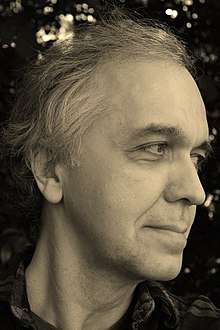Igor Vishnevetsky
Igor Georgievich Vishnevetsky (Russian: Игорь Георгиевич Вишневецкий; born 5 January 1964)[1] is a Russian-born poet, novelist, screenwriter, and editor. He has been a contributor and editor in numerous literary journals, anthologies, and scholarly periodicals since the 1980s. Some of his work has been published in English, including a translated version of his first novel, Leningrad (2010).
Igor Vishnevetsky | |
|---|---|
Игорь Георгиевич Вишневецкий | |
 | |
| Born | Igor Georgievich Vishnevetsky 5 January 1964 |
| Alma mater | Moscow State University Brown University |
| Occupation | Poet, novelist, scholar, filmmaker, educator |
| Children | Ignatiy Vishnevetsky |
Biography
Igor Vishnevetsky was born in Rostov-on-Don in 1964 to Georgiy and Alla Vishnevetsky. Vishnevetsky originally aspired to become a composer. He studied piano performance in school and audited music theory courses at Rostov State Rachmaninoff Conservatory before attending Moscow State University to pursue a degree in philology. After graduating in 1986, Vishnevetsky became an active member of the poetry and art scenes in Moscow and St. Petersburg prior to the break-up of the Soviet Union.
Vishnevetsky emigrated to the United States in 1992. Since that time his creative work has been done chiefly in North America.
In 1996 he received a Ph.D. in Russian Literature from the Department of Slavic Languages of Brown University. Subsequently, he taught at Emory University for five years. In the 2000s, he has also become a notable music historian, and is considered an authority on Sergei Prokofiev[2] and the Russian-American composer Vladimir Dukelsky.
He also was a visiting professor of Russian and Film at Carnegie Mellon University.[2] During this time, he wrote his experimental novel Leningrad which describes the dehumanizing effects of the Finno-German siege of the city during World War II and deals with transformation of former Russian capital into a Soviet city. Praised for its insights into the minds of the people who experienced the collapse of everything associated with humanity, Leningrad won a 2010 award for the best fiction published in Russia's leading literary periodical Novyi mir. In 2012 it won a prestigious "New Verbal Art (Novaya Slovesnost', or NoS)" literary award.
Since 2010 he had been working on a film version of Leningrad.[3][4] The film was completed in 2014 (a slightly shorter version in 2015) and received a number of awards.[5][6] Film historian and critic Andrei Plakhov called it "an absolutely amazing experiment,",[7] while film critic Evgeny Maisel considered Visnevetsky's film "a true challenge to contemporary professional film production."[8] As of 2018, he teaches Russian literature at the Franciscan University of Steubenville.[2]
Vishnevetsky is an Eastern Orthodox Christian.[2] His son is film critic Ignatiy Vishnevetsky.
Bibliography
Collected Poetry
- Poems (Stikhotvoreniya). Moscow: ALVA-XXI, 1992. 42 pp.
- Threefold Vision (Troynoe zrenie). New York: Slovo/Word, 1997. 88 pp.
- Air Mail: Poems 1996-2001 (Vozdushnaya pochta: Stikhi 1996—2001). Moscow: Novoe literaturnoe obozrenie, 2001. 96 pp. ISBN 5-86793-148-X
- West of the Sun (Na zapad solntsa). Moscow: Nauka; Russkiy Gulliver, 2006. 278 pp. ISBN 5-02-034198-3
- First Snow (Pervosnezhye). Moscow: Russkiy Gulliver, 2008. 76 pp. ISBN 978-5-91627-009-9
- Rhymologion (Stikhoslov). Moscow: Ikar, 2008. 126 pp. ISBN 978-5-7974-0184-1
Fiction
- Leningrad: povest'. Moscow: Vremya, 2012. 160 pp. ISBN 978-5-9691-0796-0
- Leningrad: A novel. Translated by Andrew Bromfield. Champaign - London - Dublin: Dalkey Archive Press, 2013. 124 pp. ISBN 978-1-56478-902-0
- Leningrad. Translated into Macedonian by Мirjana Naumovski. Skopje: Bata pres, 2014. 154 pp. ISBN 978-608-4654-68-1
- Non-Elective Affinities (Neizbiratelinoe srodstvo[: сollected prose – novels Leningrad (2009), Islands in the Lagoon / Ostrova v lagune (2012), Non-Elective Affinities / Neizbiratelinoe srodstvo (2013-2017), short fiction Poet Who Was Not Forgotten / Nezabytyi poet (2012)]). Moscow: EKSMO, 2018. 384 pp. ISBN 978-5-04-093120-0
- Leningrad. Traduzione a cura di Daniela Rizzi e Luisa Ruvoletto. Venezia: Libreria Editrice Cafoscarina, 2019. 216 pp. ISBN 978-88-7543-465-6
Academic Works
- Tragic Subject in Action: Andrei Bely (Tragicheskiy sub'yekt v deystvii: Andrey Belyi). Frankfurt am Main: Peter Lang, 2000. 214 pp. ISBN 3-631-35238-7
- Andrei Bely and Sergei Solovyov in Dictionary of Literary Biography, vol. 295 (2004)
- The "Eurasianist Tendency" in the Music of the 1920s and 1930s («Evraziyskoe uklonenie» v muzyke 1920-kh -1930-kh godov). Moscow: Novoe literaturnoe obozrenie, 2005. 512 pp.
- Sergei Prokofiev (Sergey Prokof'ev). Moscow: Molodaya gvardiya, 2009. 704 pp. ISBN 978-5-235-03212-5
- Arseny Tarkovsky in Dictionary of Literary Biography, vol. 359 (2011)
- The Literary Fate of Vasiliy Kondrat'ev (Literaturnaya sud'ba Vasiliya Konrdat'eva), Novoe literaturnoe obozrenie, 3/157 (2019): 239-267
Filmography
- Leningrad (2015)
References
- "Игорь Вишневецкий. Поэт, филолог". Новая литературная карта.
- Pawsey, Maggie (5 December 2018). "Russian author shares experience, life story through teaching". The Troubador. Franciscan University of Steubenville. Retrieved 14 December 2019.
- "Archived copy". Archived from the original on 17 April 2013. Retrieved 19 March 2013.CS1 maint: archived copy as title (link)
- "Игорь Вишневецкий – лауреат премии НОС". Радио Свобода.
- "12-й «Дух огня» завершился победой румынской ретро-драмы".
- "Ейск-2015. О доблестях, о подвигах, о славе".
- "Archived copy". Archived from the original on 15 September 2016. Retrieved 11 August 2016.CS1 maint: archived copy as title (link)
- "«Дух огня» 2014. Существования позор".